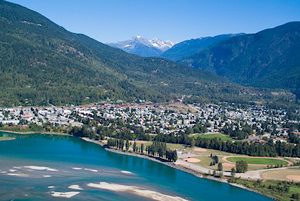
Small towns and cities throughout B.C. are in trouble.
The present model of local government financing simply doesn't work, and indeed, it can't work.
Over the past 32 years, successive provincial governments have chipped away at transfer payments, leaving local governments with little choice but to cut services and increase taxes. It also ended the provincial role of ensuring less well off communities can provide services comparable to the rest.
Compounding the problem is the massive economic transition underway in our province -- one marked by the decline of high-value industries such as forestry. For many towns the result has been a shrinking tax base as businesses close and workers leave. Small, resource-based towns are hit especially hard.
The results have been predictable -- large corporations and small businesses alike are demanding tax breaks, well aware that their competitors benefit from more favourable tax regimes elsewhere.
Residents in Port Alberni saw their tax bills jump by 23.6 per cent this year when Catalyst Paper refused to pay its taxes. Shifting the tax burden from business to residents and driving up user charges increases the burden on residential property owners, takes money out of consumers' pockets, and ultimately, does not solve the real problem.
The need for a new model of local government financing is becoming more urgent with each passing year.
For the past year we have studied this issue, and have recently released a paper titled "Local Prosperity: Options for Municipal Revenue Growth in British Columbia." We argue that local governments in B.C. are far too dependent on property taxes and property-related user charges. In the past 10 years, municipalities have imposed a more rapidly growing burden of taxes and goods and service charges on local taxpayers than the provincial government placed on provincial taxpayers -- a burden that is 52 per cent higher.
The solution? B.C.'s municipalities need access to a much broader range of revenue sources.
Dozens of ways to raise revenues
In our report, we propose dozens of new revenue generating ideas and promising economic development concepts.
Revelstoke provides a great example of how waste wood from the local mill can be used to fuel a district heating system and generate revenue for the city. In another example, Dawson Creek played an important role in helping to establish the Peace Energy Cooperative. This producer co-op helps small-scale electricity producers sell their power to larger distributors.
Local procurement policies and import substitution strategies can help to create markets for locally produced goods and services and reduce the need for more expensive imports.
Empower small towns
But in order to take advantage of opportunities for economic diversification, small towns need a fair share of the tax revenues generated in their communities.
This will require the provincial government act to increase transfers, as well as broaden the revenue tools available to local governments.
Change is needed if small towns in British Columbia are to continue to offer a high quality of life and economic opportunities for the next generation.
To read our discussion paper, visit: www.thinkcity.ca/localprosperity.
[Editor's Note: As per Tyee tradition in recent years, we've closed the comment section for the holidays. Thank you all for creating such a thoughtful, alive and insightful conversation this year. We look forward to more of the same in the next. To you and yours, a heartfelt happy holidays!] ![]()













